Ethics and Professional Practice: Key Frameworks and Issues
VerifiedAdded on 2021/04/21
|11
|2829
|247
Essay
AI Summary
This essay delves into the critical aspects of ethics and professional practice, emphasizing the significance of ethical frameworks in various professional contexts. It explores key principles such as respect for autonomy, non-maleficence, beneficence, and justice, highlighting their importance in ethical decision-making. The essay examines the ethical frameworks, including duty-based and outcome-based theories, and discusses their application in professional settings. It also addresses challenges and issues associated with these frameworks, such as conflicts and cultural variations. Furthermore, the essay provides a detailed analysis of informed consent, its elements, and its process, emphasizing its role in ethical practice. It also discusses limits of confidentiality and professional misconduct, underscoring the importance of maintaining ethical standards. The essay concludes by emphasizing the role of ethical awareness and responsible decision-making in professional practices.
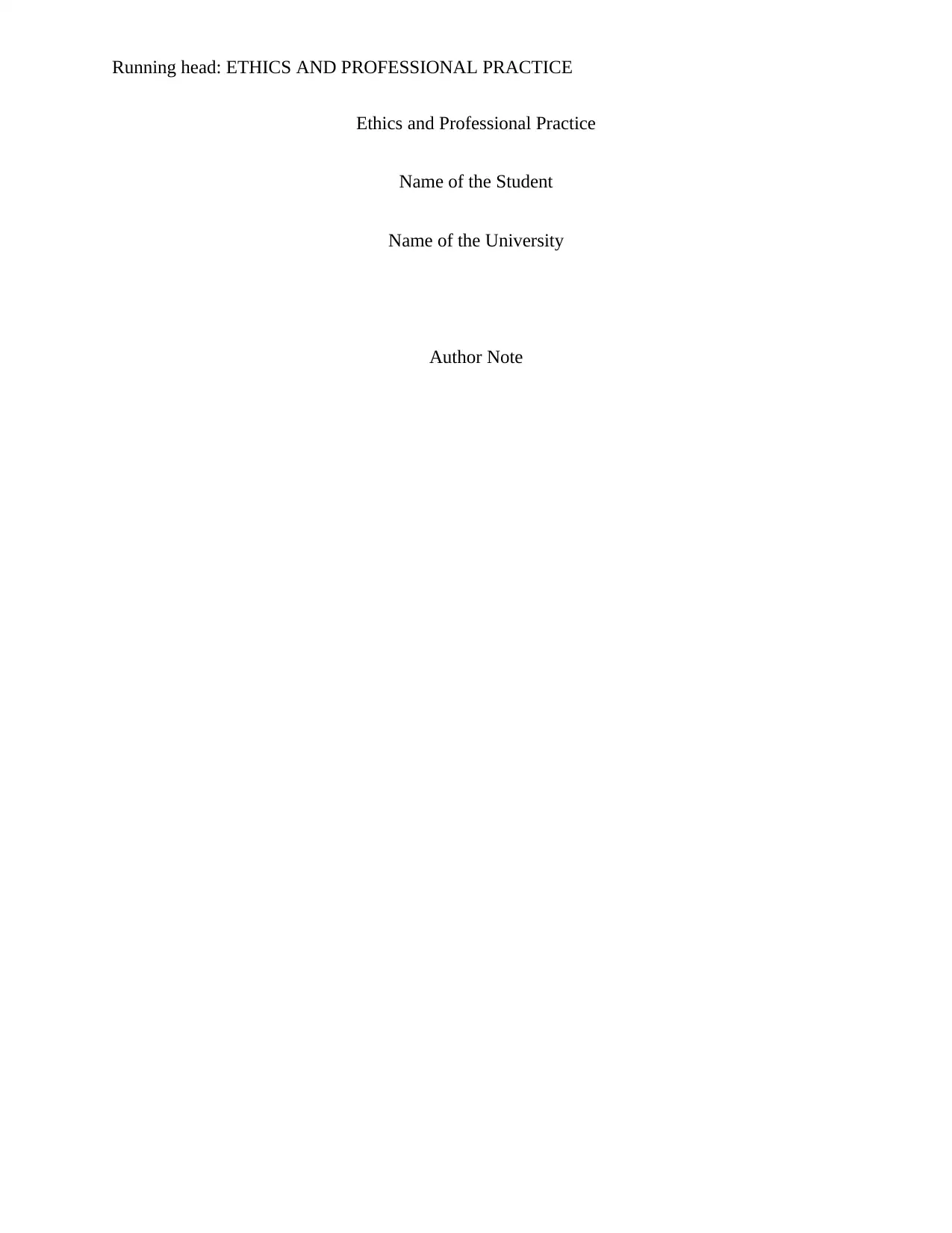
Running head: ETHICS AND PROFESSIONAL PRACTICE
Ethics and Professional Practice
Name of the Student
Name of the University
Author Note
Ethics and Professional Practice
Name of the Student
Name of the University
Author Note
Paraphrase This Document
Need a fresh take? Get an instant paraphrase of this document with our AI Paraphraser
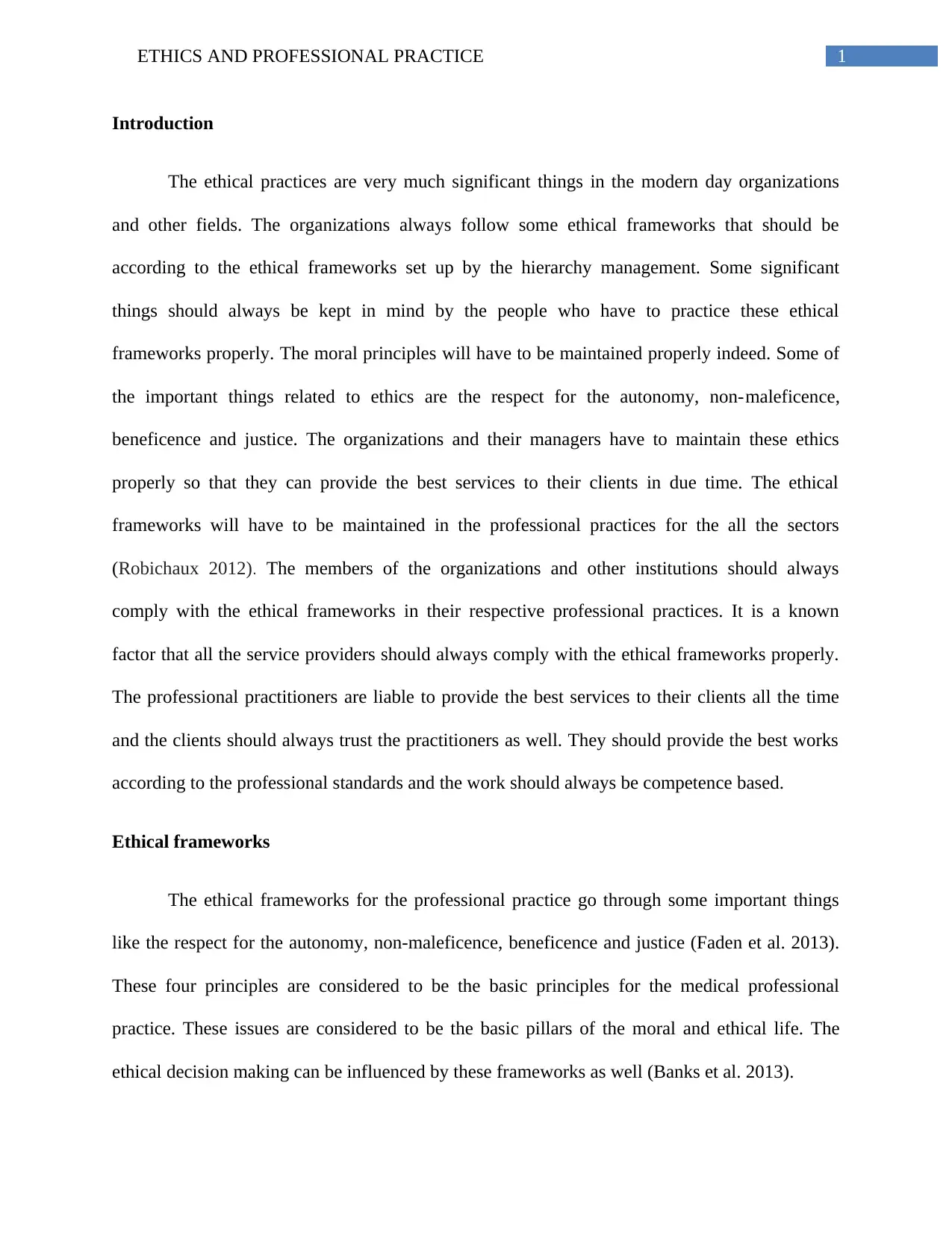
1ETHICS AND PROFESSIONAL PRACTICE
Introduction
The ethical practices are very much significant things in the modern day organizations
and other fields. The organizations always follow some ethical frameworks that should be
according to the ethical frameworks set up by the hierarchy management. Some significant
things should always be kept in mind by the people who have to practice these ethical
frameworks properly. The moral principles will have to be maintained properly indeed. Some of
the important things related to ethics are the respect for the autonomy, non-maleficence,
beneficence and justice. The organizations and their managers have to maintain these ethics
properly so that they can provide the best services to their clients in due time. The ethical
frameworks will have to be maintained in the professional practices for the all the sectors
(Robichaux 2012). The members of the organizations and other institutions should always
comply with the ethical frameworks in their respective professional practices. It is a known
factor that all the service providers should always comply with the ethical frameworks properly.
The professional practitioners are liable to provide the best services to their clients all the time
and the clients should always trust the practitioners as well. They should provide the best works
according to the professional standards and the work should always be competence based.
Ethical frameworks
The ethical frameworks for the professional practice go through some important things
like the respect for the autonomy, non-maleficence, beneficence and justice (Faden et al. 2013).
These four principles are considered to be the basic principles for the medical professional
practice. These issues are considered to be the basic pillars of the moral and ethical life. The
ethical decision making can be influenced by these frameworks as well (Banks et al. 2013).
Introduction
The ethical practices are very much significant things in the modern day organizations
and other fields. The organizations always follow some ethical frameworks that should be
according to the ethical frameworks set up by the hierarchy management. Some significant
things should always be kept in mind by the people who have to practice these ethical
frameworks properly. The moral principles will have to be maintained properly indeed. Some of
the important things related to ethics are the respect for the autonomy, non-maleficence,
beneficence and justice. The organizations and their managers have to maintain these ethics
properly so that they can provide the best services to their clients in due time. The ethical
frameworks will have to be maintained in the professional practices for the all the sectors
(Robichaux 2012). The members of the organizations and other institutions should always
comply with the ethical frameworks in their respective professional practices. It is a known
factor that all the service providers should always comply with the ethical frameworks properly.
The professional practitioners are liable to provide the best services to their clients all the time
and the clients should always trust the practitioners as well. They should provide the best works
according to the professional standards and the work should always be competence based.
Ethical frameworks
The ethical frameworks for the professional practice go through some important things
like the respect for the autonomy, non-maleficence, beneficence and justice (Faden et al. 2013).
These four principles are considered to be the basic principles for the medical professional
practice. These issues are considered to be the basic pillars of the moral and ethical life. The
ethical decision making can be influenced by these frameworks as well (Banks et al. 2013).
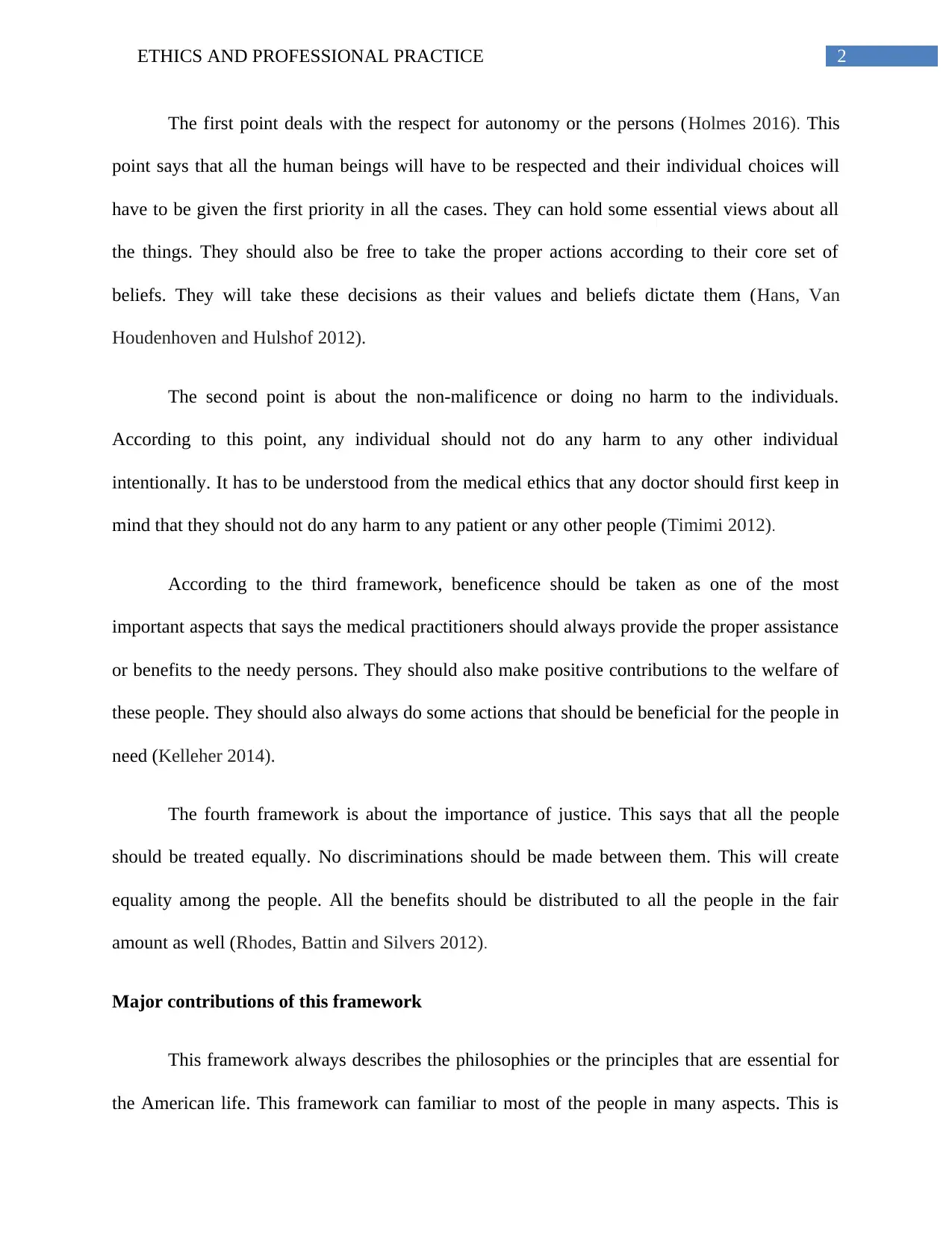
2ETHICS AND PROFESSIONAL PRACTICE
The first point deals with the respect for autonomy or the persons (Holmes 2016). This
point says that all the human beings will have to be respected and their individual choices will
have to be given the first priority in all the cases. They can hold some essential views about all
the things. They should also be free to take the proper actions according to their core set of
beliefs. They will take these decisions as their values and beliefs dictate them (Hans, Van
Houdenhoven and Hulshof 2012).
The second point is about the non-malificence or doing no harm to the individuals.
According to this point, any individual should not do any harm to any other individual
intentionally. It has to be understood from the medical ethics that any doctor should first keep in
mind that they should not do any harm to any patient or any other people (Timimi 2012).
According to the third framework, beneficence should be taken as one of the most
important aspects that says the medical practitioners should always provide the proper assistance
or benefits to the needy persons. They should also make positive contributions to the welfare of
these people. They should also always do some actions that should be beneficial for the people in
need (Kelleher 2014).
The fourth framework is about the importance of justice. This says that all the people
should be treated equally. No discriminations should be made between them. This will create
equality among the people. All the benefits should be distributed to all the people in the fair
amount as well (Rhodes, Battin and Silvers 2012).
Major contributions of this framework
This framework always describes the philosophies or the principles that are essential for
the American life. This framework can familiar to most of the people in many aspects. This is
The first point deals with the respect for autonomy or the persons (Holmes 2016). This
point says that all the human beings will have to be respected and their individual choices will
have to be given the first priority in all the cases. They can hold some essential views about all
the things. They should also be free to take the proper actions according to their core set of
beliefs. They will take these decisions as their values and beliefs dictate them (Hans, Van
Houdenhoven and Hulshof 2012).
The second point is about the non-malificence or doing no harm to the individuals.
According to this point, any individual should not do any harm to any other individual
intentionally. It has to be understood from the medical ethics that any doctor should first keep in
mind that they should not do any harm to any patient or any other people (Timimi 2012).
According to the third framework, beneficence should be taken as one of the most
important aspects that says the medical practitioners should always provide the proper assistance
or benefits to the needy persons. They should also make positive contributions to the welfare of
these people. They should also always do some actions that should be beneficial for the people in
need (Kelleher 2014).
The fourth framework is about the importance of justice. This says that all the people
should be treated equally. No discriminations should be made between them. This will create
equality among the people. All the benefits should be distributed to all the people in the fair
amount as well (Rhodes, Battin and Silvers 2012).
Major contributions of this framework
This framework always describes the philosophies or the principles that are essential for
the American life. This framework can familiar to most of the people in many aspects. This is
⊘ This is a preview!⊘
Do you want full access?
Subscribe today to unlock all pages.

Trusted by 1+ million students worldwide
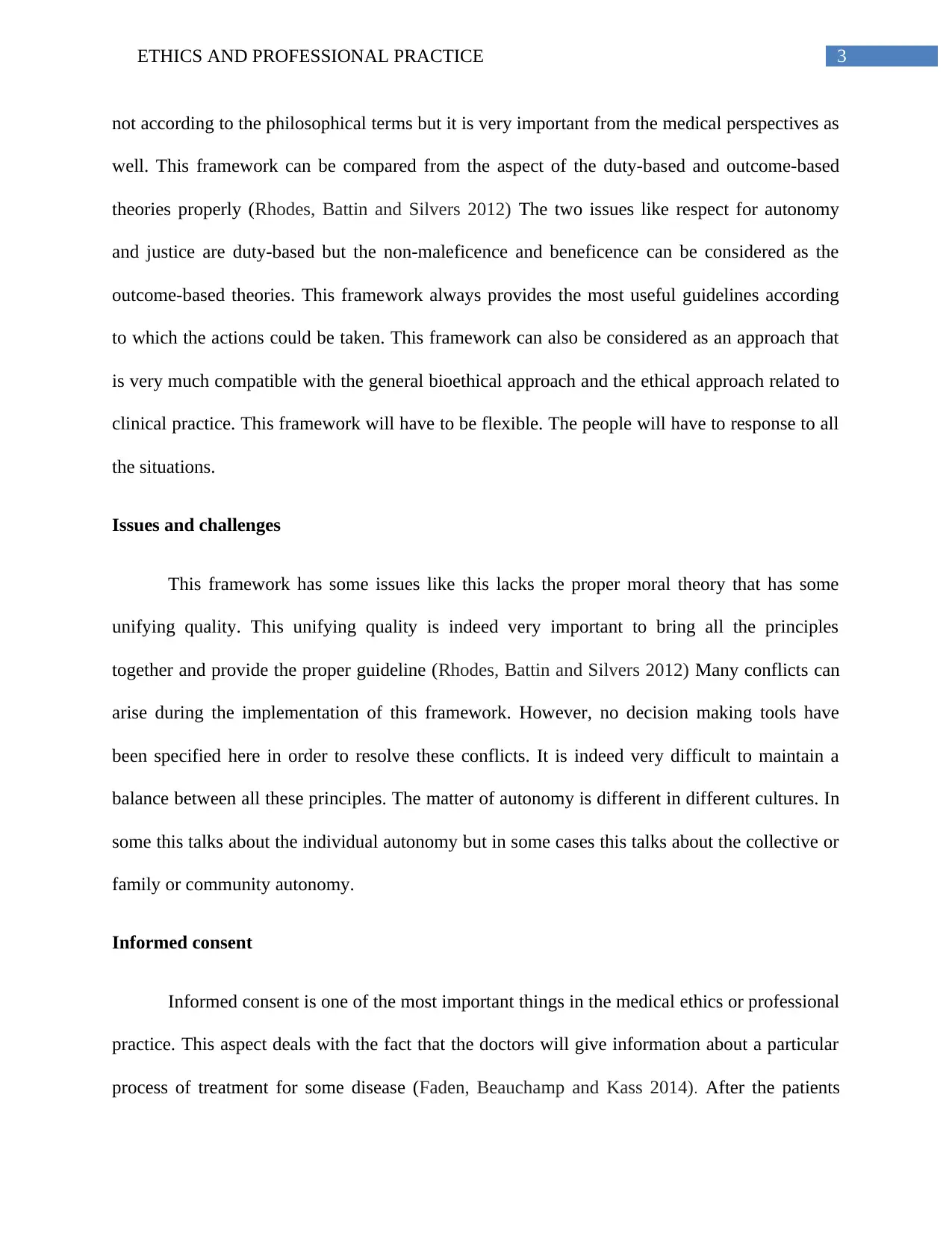
3ETHICS AND PROFESSIONAL PRACTICE
not according to the philosophical terms but it is very important from the medical perspectives as
well. This framework can be compared from the aspect of the duty-based and outcome-based
theories properly (Rhodes, Battin and Silvers 2012) The two issues like respect for autonomy
and justice are duty-based but the non-maleficence and beneficence can be considered as the
outcome-based theories. This framework always provides the most useful guidelines according
to which the actions could be taken. This framework can also be considered as an approach that
is very much compatible with the general bioethical approach and the ethical approach related to
clinical practice. This framework will have to be flexible. The people will have to response to all
the situations.
Issues and challenges
This framework has some issues like this lacks the proper moral theory that has some
unifying quality. This unifying quality is indeed very important to bring all the principles
together and provide the proper guideline (Rhodes, Battin and Silvers 2012) Many conflicts can
arise during the implementation of this framework. However, no decision making tools have
been specified here in order to resolve these conflicts. It is indeed very difficult to maintain a
balance between all these principles. The matter of autonomy is different in different cultures. In
some this talks about the individual autonomy but in some cases this talks about the collective or
family or community autonomy.
Informed consent
Informed consent is one of the most important things in the medical ethics or professional
practice. This aspect deals with the fact that the doctors will give information about a particular
process of treatment for some disease (Faden, Beauchamp and Kass 2014). After the patients
not according to the philosophical terms but it is very important from the medical perspectives as
well. This framework can be compared from the aspect of the duty-based and outcome-based
theories properly (Rhodes, Battin and Silvers 2012) The two issues like respect for autonomy
and justice are duty-based but the non-maleficence and beneficence can be considered as the
outcome-based theories. This framework always provides the most useful guidelines according
to which the actions could be taken. This framework can also be considered as an approach that
is very much compatible with the general bioethical approach and the ethical approach related to
clinical practice. This framework will have to be flexible. The people will have to response to all
the situations.
Issues and challenges
This framework has some issues like this lacks the proper moral theory that has some
unifying quality. This unifying quality is indeed very important to bring all the principles
together and provide the proper guideline (Rhodes, Battin and Silvers 2012) Many conflicts can
arise during the implementation of this framework. However, no decision making tools have
been specified here in order to resolve these conflicts. It is indeed very difficult to maintain a
balance between all these principles. The matter of autonomy is different in different cultures. In
some this talks about the individual autonomy but in some cases this talks about the collective or
family or community autonomy.
Informed consent
Informed consent is one of the most important things in the medical ethics or professional
practice. This aspect deals with the fact that the doctors will give information about a particular
process of treatment for some disease (Faden, Beauchamp and Kass 2014). After the patients
Paraphrase This Document
Need a fresh take? Get an instant paraphrase of this document with our AI Paraphraser
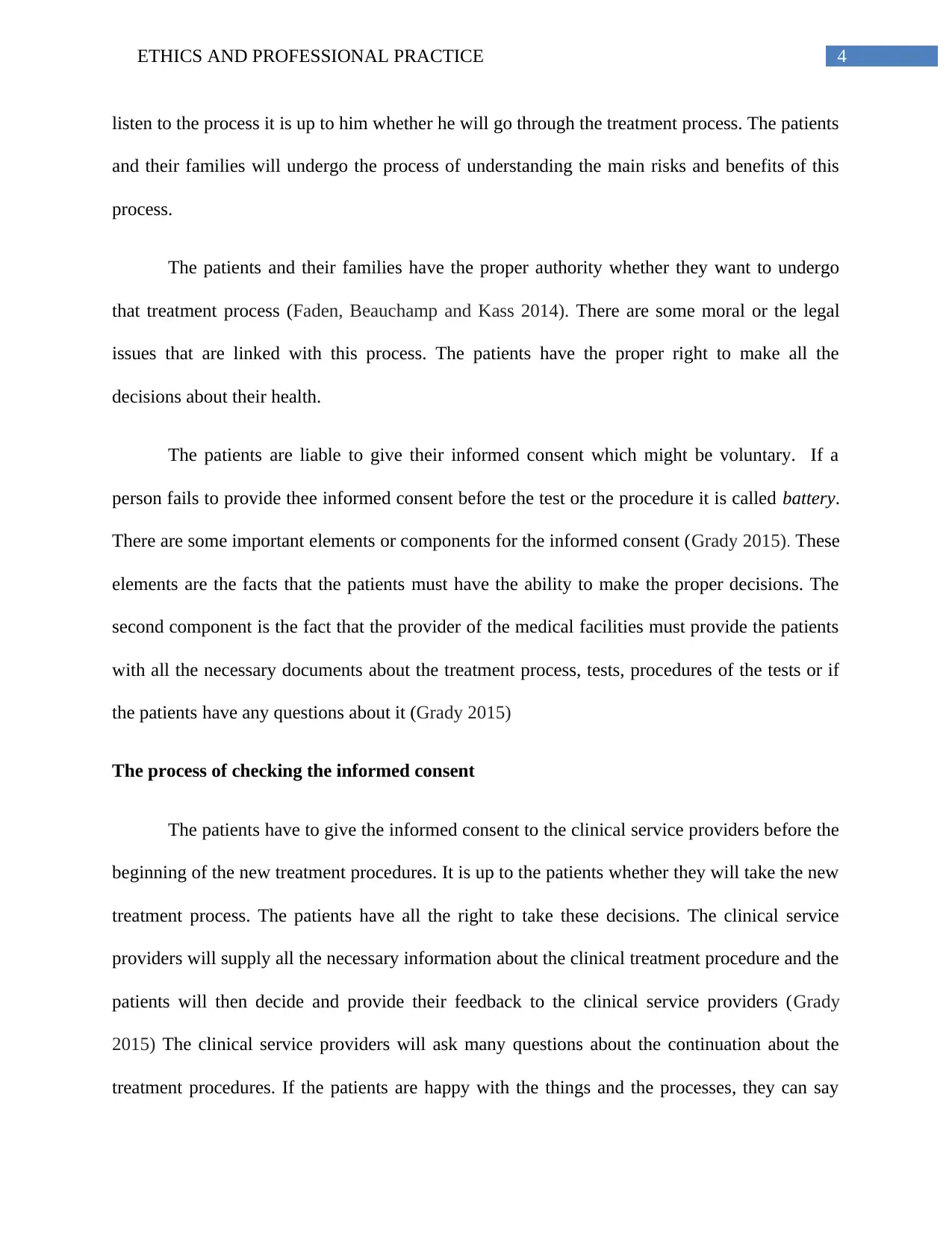
4ETHICS AND PROFESSIONAL PRACTICE
listen to the process it is up to him whether he will go through the treatment process. The patients
and their families will undergo the process of understanding the main risks and benefits of this
process.
The patients and their families have the proper authority whether they want to undergo
that treatment process (Faden, Beauchamp and Kass 2014). There are some moral or the legal
issues that are linked with this process. The patients have the proper right to make all the
decisions about their health.
The patients are liable to give their informed consent which might be voluntary. If a
person fails to provide thee informed consent before the test or the procedure it is called battery.
There are some important elements or components for the informed consent (Grady 2015). These
elements are the facts that the patients must have the ability to make the proper decisions. The
second component is the fact that the provider of the medical facilities must provide the patients
with all the necessary documents about the treatment process, tests, procedures of the tests or if
the patients have any questions about it (Grady 2015)
The process of checking the informed consent
The patients have to give the informed consent to the clinical service providers before the
beginning of the new treatment procedures. It is up to the patients whether they will take the new
treatment process. The patients have all the right to take these decisions. The clinical service
providers will supply all the necessary information about the clinical treatment procedure and the
patients will then decide and provide their feedback to the clinical service providers (Grady
2015) The clinical service providers will ask many questions about the continuation about the
treatment procedures. If the patients are happy with the things and the processes, they can say
listen to the process it is up to him whether he will go through the treatment process. The patients
and their families will undergo the process of understanding the main risks and benefits of this
process.
The patients and their families have the proper authority whether they want to undergo
that treatment process (Faden, Beauchamp and Kass 2014). There are some moral or the legal
issues that are linked with this process. The patients have the proper right to make all the
decisions about their health.
The patients are liable to give their informed consent which might be voluntary. If a
person fails to provide thee informed consent before the test or the procedure it is called battery.
There are some important elements or components for the informed consent (Grady 2015). These
elements are the facts that the patients must have the ability to make the proper decisions. The
second component is the fact that the provider of the medical facilities must provide the patients
with all the necessary documents about the treatment process, tests, procedures of the tests or if
the patients have any questions about it (Grady 2015)
The process of checking the informed consent
The patients have to give the informed consent to the clinical service providers before the
beginning of the new treatment procedures. It is up to the patients whether they will take the new
treatment process. The patients have all the right to take these decisions. The clinical service
providers will supply all the necessary information about the clinical treatment procedure and the
patients will then decide and provide their feedback to the clinical service providers (Grady
2015) The clinical service providers will ask many questions about the continuation about the
treatment procedures. If the patients are happy with the things and the processes, they can say
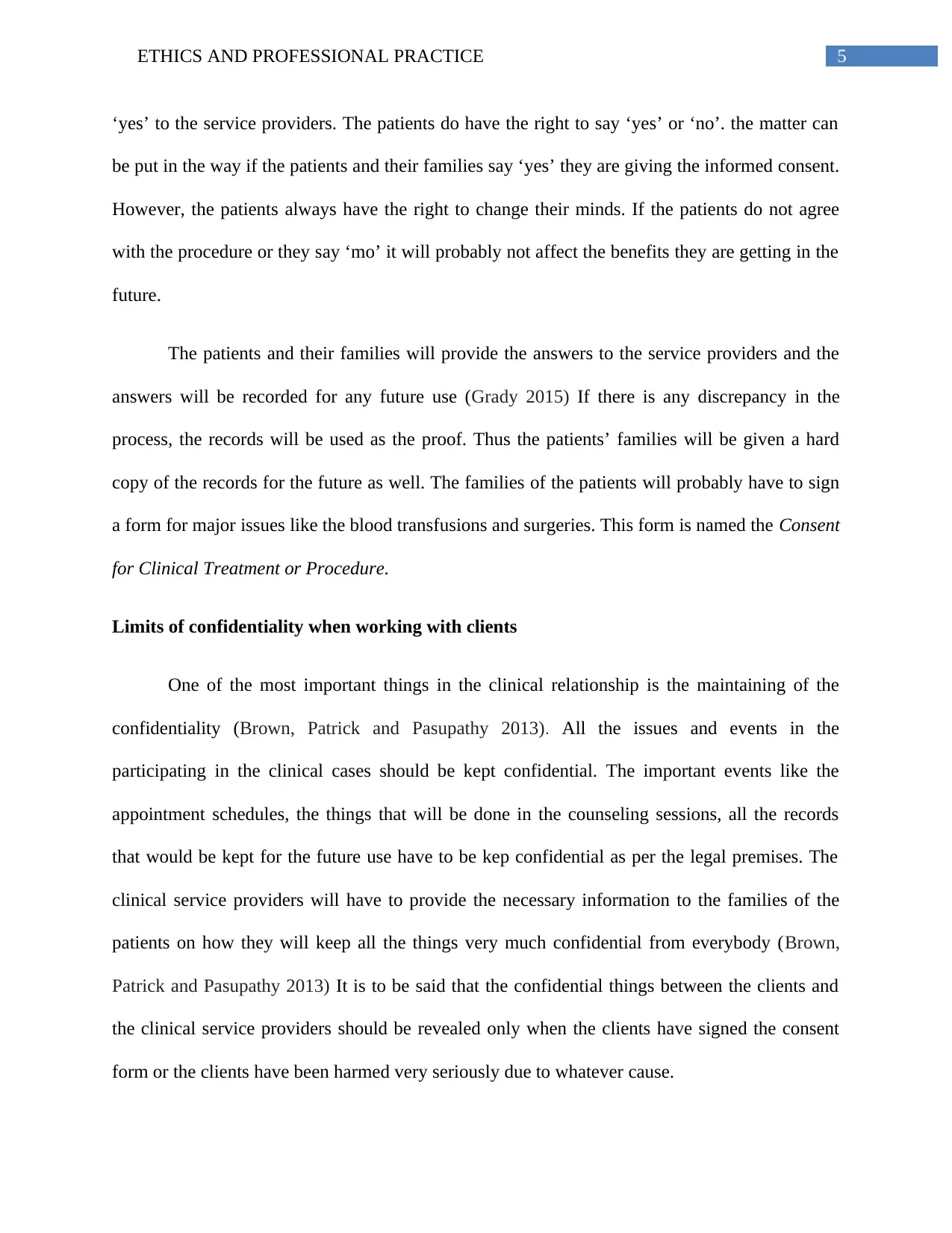
5ETHICS AND PROFESSIONAL PRACTICE
‘yes’ to the service providers. The patients do have the right to say ‘yes’ or ‘no’. the matter can
be put in the way if the patients and their families say ‘yes’ they are giving the informed consent.
However, the patients always have the right to change their minds. If the patients do not agree
with the procedure or they say ‘mo’ it will probably not affect the benefits they are getting in the
future.
The patients and their families will provide the answers to the service providers and the
answers will be recorded for any future use (Grady 2015) If there is any discrepancy in the
process, the records will be used as the proof. Thus the patients’ families will be given a hard
copy of the records for the future as well. The families of the patients will probably have to sign
a form for major issues like the blood transfusions and surgeries. This form is named the Consent
for Clinical Treatment or Procedure.
Limits of confidentiality when working with clients
One of the most important things in the clinical relationship is the maintaining of the
confidentiality (Brown, Patrick and Pasupathy 2013). All the issues and events in the
participating in the clinical cases should be kept confidential. The important events like the
appointment schedules, the things that will be done in the counseling sessions, all the records
that would be kept for the future use have to be kep confidential as per the legal premises. The
clinical service providers will have to provide the necessary information to the families of the
patients on how they will keep all the things very much confidential from everybody (Brown,
Patrick and Pasupathy 2013) It is to be said that the confidential things between the clients and
the clinical service providers should be revealed only when the clients have signed the consent
form or the clients have been harmed very seriously due to whatever cause.
‘yes’ to the service providers. The patients do have the right to say ‘yes’ or ‘no’. the matter can
be put in the way if the patients and their families say ‘yes’ they are giving the informed consent.
However, the patients always have the right to change their minds. If the patients do not agree
with the procedure or they say ‘mo’ it will probably not affect the benefits they are getting in the
future.
The patients and their families will provide the answers to the service providers and the
answers will be recorded for any future use (Grady 2015) If there is any discrepancy in the
process, the records will be used as the proof. Thus the patients’ families will be given a hard
copy of the records for the future as well. The families of the patients will probably have to sign
a form for major issues like the blood transfusions and surgeries. This form is named the Consent
for Clinical Treatment or Procedure.
Limits of confidentiality when working with clients
One of the most important things in the clinical relationship is the maintaining of the
confidentiality (Brown, Patrick and Pasupathy 2013). All the issues and events in the
participating in the clinical cases should be kept confidential. The important events like the
appointment schedules, the things that will be done in the counseling sessions, all the records
that would be kept for the future use have to be kep confidential as per the legal premises. The
clinical service providers will have to provide the necessary information to the families of the
patients on how they will keep all the things very much confidential from everybody (Brown,
Patrick and Pasupathy 2013) It is to be said that the confidential things between the clients and
the clinical service providers should be revealed only when the clients have signed the consent
form or the clients have been harmed very seriously due to whatever cause.
⊘ This is a preview!⊘
Do you want full access?
Subscribe today to unlock all pages.

Trusted by 1+ million students worldwide
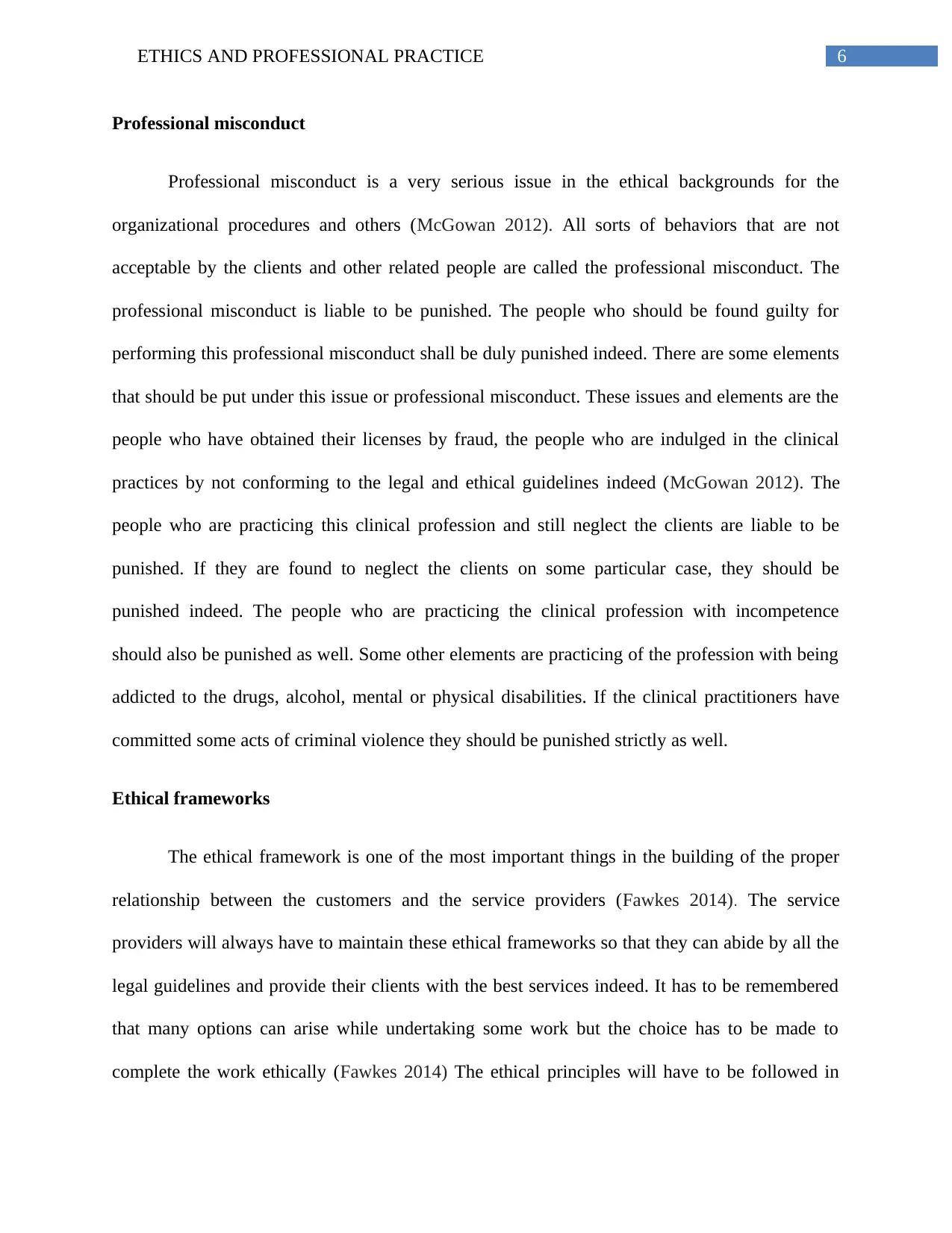
6ETHICS AND PROFESSIONAL PRACTICE
Professional misconduct
Professional misconduct is a very serious issue in the ethical backgrounds for the
organizational procedures and others (McGowan 2012). All sorts of behaviors that are not
acceptable by the clients and other related people are called the professional misconduct. The
professional misconduct is liable to be punished. The people who should be found guilty for
performing this professional misconduct shall be duly punished indeed. There are some elements
that should be put under this issue or professional misconduct. These issues and elements are the
people who have obtained their licenses by fraud, the people who are indulged in the clinical
practices by not conforming to the legal and ethical guidelines indeed (McGowan 2012). The
people who are practicing this clinical profession and still neglect the clients are liable to be
punished. If they are found to neglect the clients on some particular case, they should be
punished indeed. The people who are practicing the clinical profession with incompetence
should also be punished as well. Some other elements are practicing of the profession with being
addicted to the drugs, alcohol, mental or physical disabilities. If the clinical practitioners have
committed some acts of criminal violence they should be punished strictly as well.
Ethical frameworks
The ethical framework is one of the most important things in the building of the proper
relationship between the customers and the service providers (Fawkes 2014). The service
providers will always have to maintain these ethical frameworks so that they can abide by all the
legal guidelines and provide their clients with the best services indeed. It has to be remembered
that many options can arise while undertaking some work but the choice has to be made to
complete the work ethically (Fawkes 2014) The ethical principles will have to be followed in
Professional misconduct
Professional misconduct is a very serious issue in the ethical backgrounds for the
organizational procedures and others (McGowan 2012). All sorts of behaviors that are not
acceptable by the clients and other related people are called the professional misconduct. The
professional misconduct is liable to be punished. The people who should be found guilty for
performing this professional misconduct shall be duly punished indeed. There are some elements
that should be put under this issue or professional misconduct. These issues and elements are the
people who have obtained their licenses by fraud, the people who are indulged in the clinical
practices by not conforming to the legal and ethical guidelines indeed (McGowan 2012). The
people who are practicing this clinical profession and still neglect the clients are liable to be
punished. If they are found to neglect the clients on some particular case, they should be
punished indeed. The people who are practicing the clinical profession with incompetence
should also be punished as well. Some other elements are practicing of the profession with being
addicted to the drugs, alcohol, mental or physical disabilities. If the clinical practitioners have
committed some acts of criminal violence they should be punished strictly as well.
Ethical frameworks
The ethical framework is one of the most important things in the building of the proper
relationship between the customers and the service providers (Fawkes 2014). The service
providers will always have to maintain these ethical frameworks so that they can abide by all the
legal guidelines and provide their clients with the best services indeed. It has to be remembered
that many options can arise while undertaking some work but the choice has to be made to
complete the work ethically (Fawkes 2014) The ethical principles will have to be followed in
Paraphrase This Document
Need a fresh take? Get an instant paraphrase of this document with our AI Paraphraser
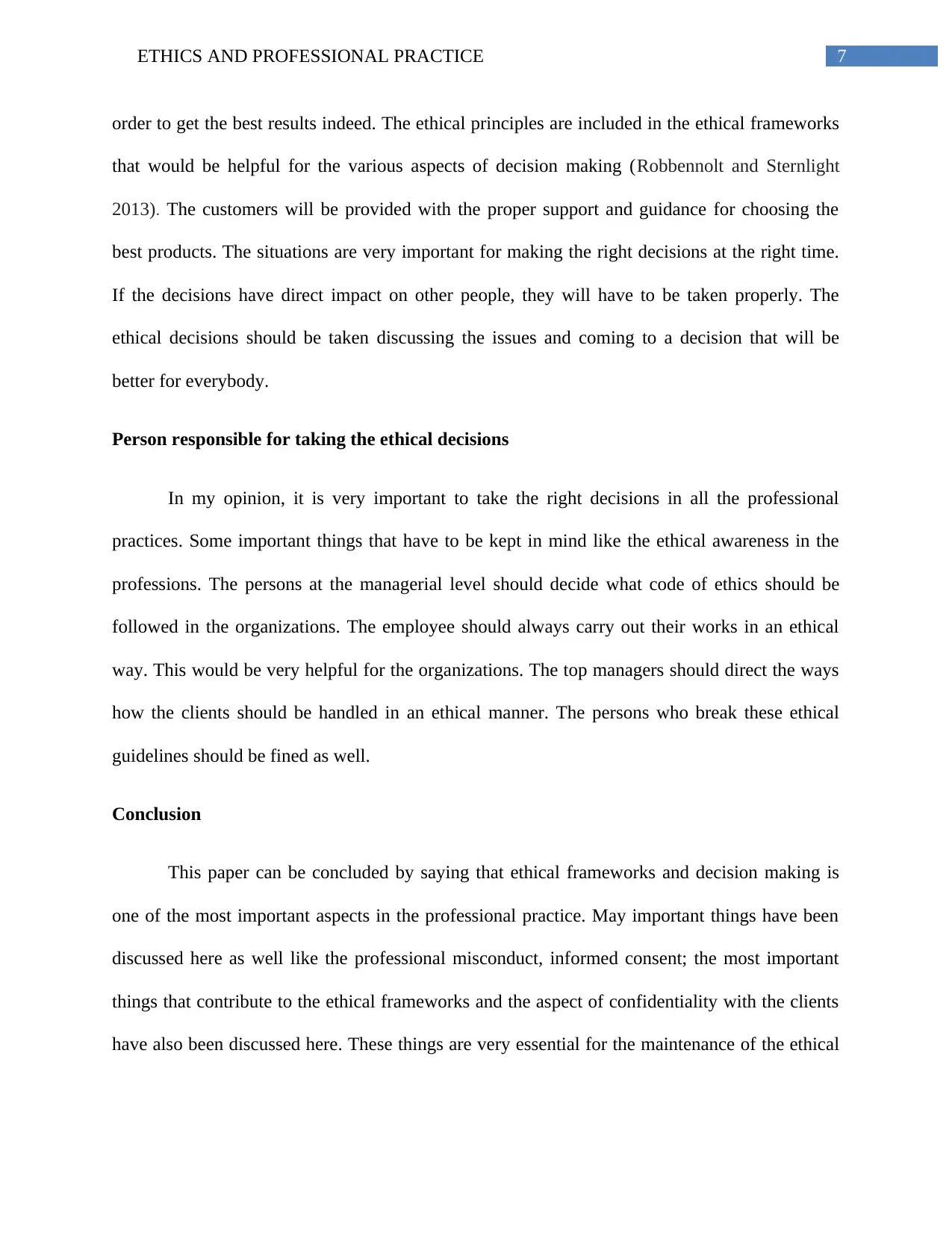
7ETHICS AND PROFESSIONAL PRACTICE
order to get the best results indeed. The ethical principles are included in the ethical frameworks
that would be helpful for the various aspects of decision making (Robbennolt and Sternlight
2013). The customers will be provided with the proper support and guidance for choosing the
best products. The situations are very important for making the right decisions at the right time.
If the decisions have direct impact on other people, they will have to be taken properly. The
ethical decisions should be taken discussing the issues and coming to a decision that will be
better for everybody.
Person responsible for taking the ethical decisions
In my opinion, it is very important to take the right decisions in all the professional
practices. Some important things that have to be kept in mind like the ethical awareness in the
professions. The persons at the managerial level should decide what code of ethics should be
followed in the organizations. The employee should always carry out their works in an ethical
way. This would be very helpful for the organizations. The top managers should direct the ways
how the clients should be handled in an ethical manner. The persons who break these ethical
guidelines should be fined as well.
Conclusion
This paper can be concluded by saying that ethical frameworks and decision making is
one of the most important aspects in the professional practice. May important things have been
discussed here as well like the professional misconduct, informed consent; the most important
things that contribute to the ethical frameworks and the aspect of confidentiality with the clients
have also been discussed here. These things are very essential for the maintenance of the ethical
order to get the best results indeed. The ethical principles are included in the ethical frameworks
that would be helpful for the various aspects of decision making (Robbennolt and Sternlight
2013). The customers will be provided with the proper support and guidance for choosing the
best products. The situations are very important for making the right decisions at the right time.
If the decisions have direct impact on other people, they will have to be taken properly. The
ethical decisions should be taken discussing the issues and coming to a decision that will be
better for everybody.
Person responsible for taking the ethical decisions
In my opinion, it is very important to take the right decisions in all the professional
practices. Some important things that have to be kept in mind like the ethical awareness in the
professions. The persons at the managerial level should decide what code of ethics should be
followed in the organizations. The employee should always carry out their works in an ethical
way. This would be very helpful for the organizations. The top managers should direct the ways
how the clients should be handled in an ethical manner. The persons who break these ethical
guidelines should be fined as well.
Conclusion
This paper can be concluded by saying that ethical frameworks and decision making is
one of the most important aspects in the professional practice. May important things have been
discussed here as well like the professional misconduct, informed consent; the most important
things that contribute to the ethical frameworks and the aspect of confidentiality with the clients
have also been discussed here. These things are very essential for the maintenance of the ethical
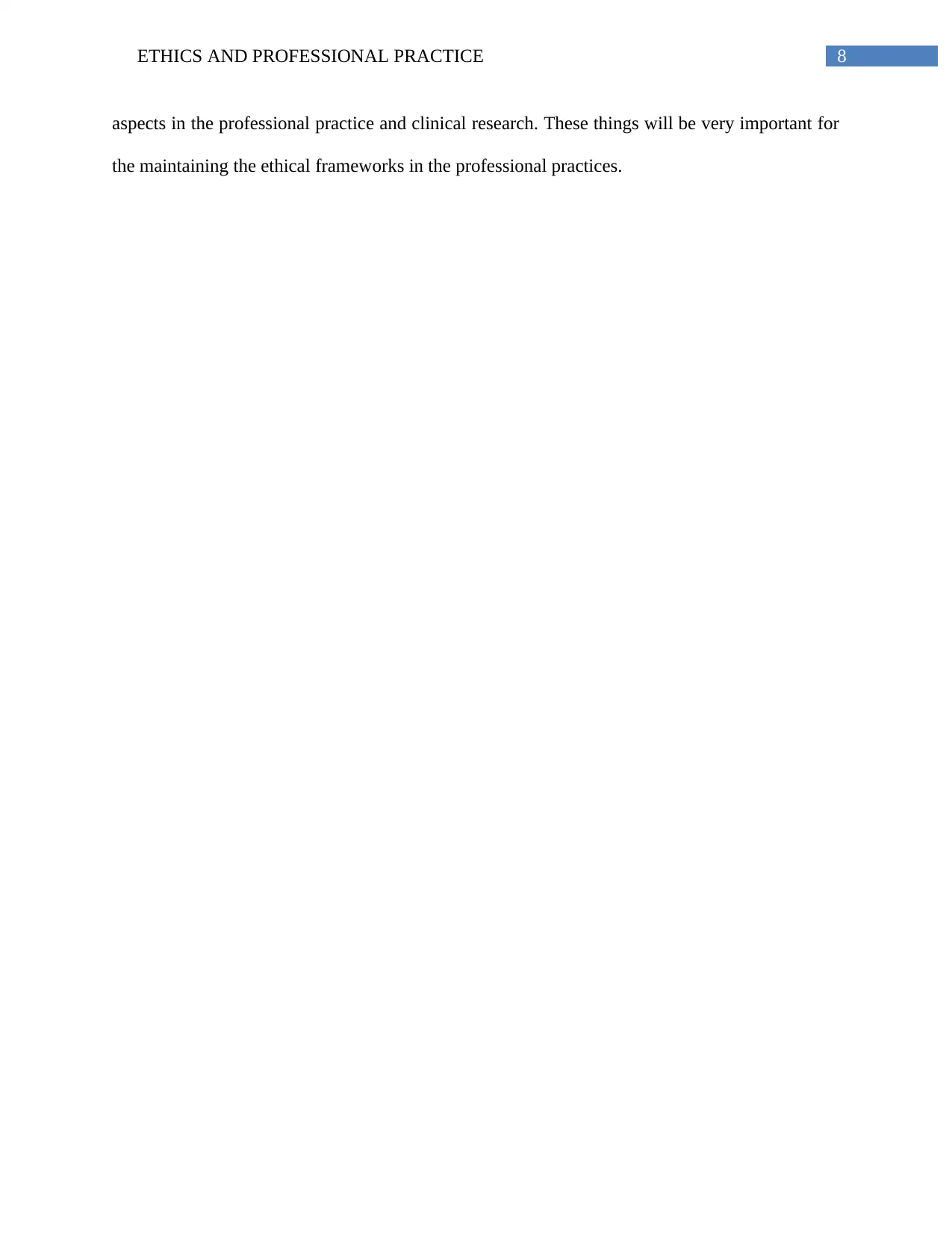
8ETHICS AND PROFESSIONAL PRACTICE
aspects in the professional practice and clinical research. These things will be very important for
the maintaining the ethical frameworks in the professional practices.
aspects in the professional practice and clinical research. These things will be very important for
the maintaining the ethical frameworks in the professional practices.
⊘ This is a preview!⊘
Do you want full access?
Subscribe today to unlock all pages.

Trusted by 1+ million students worldwide
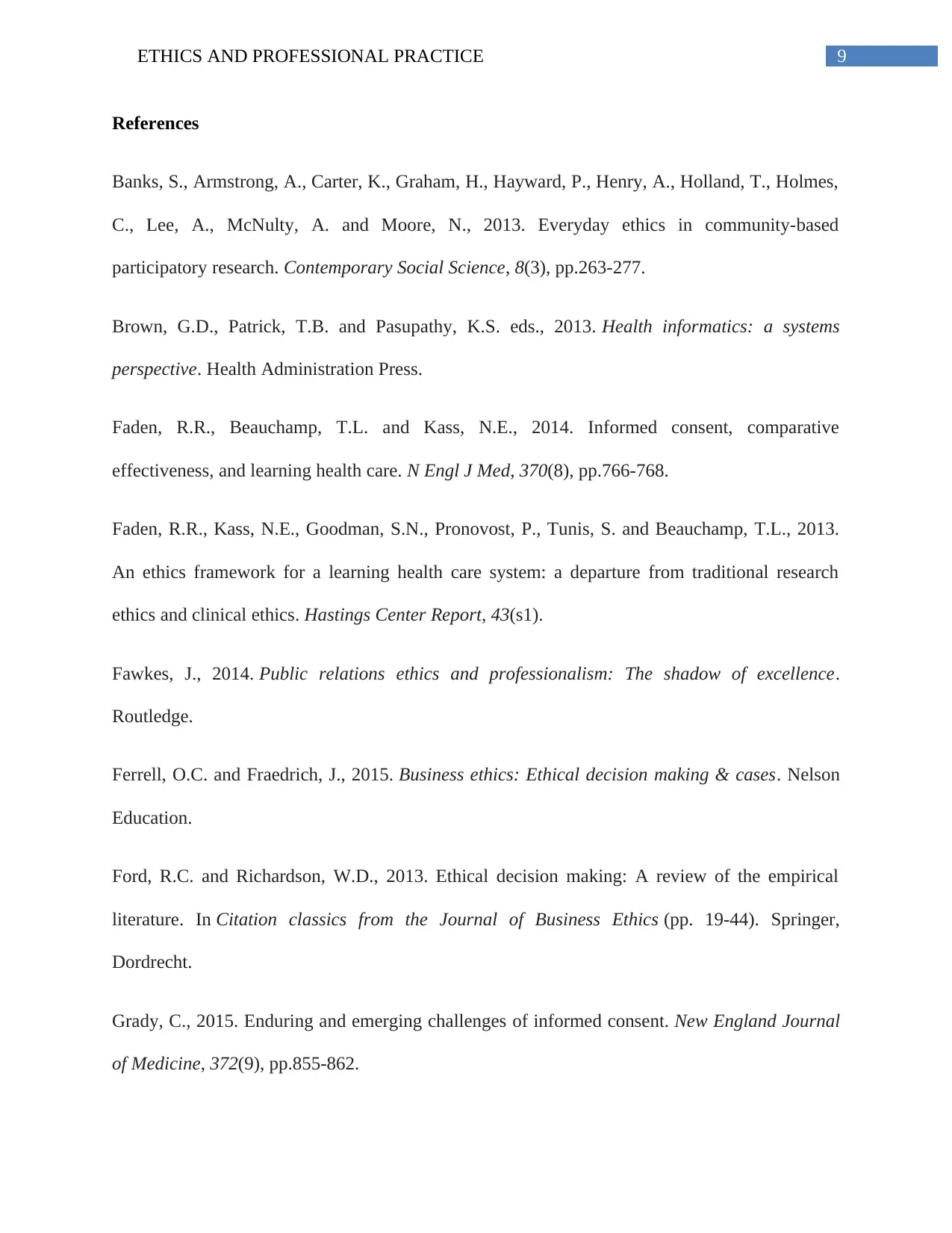
9ETHICS AND PROFESSIONAL PRACTICE
References
Banks, S., Armstrong, A., Carter, K., Graham, H., Hayward, P., Henry, A., Holland, T., Holmes,
C., Lee, A., McNulty, A. and Moore, N., 2013. Everyday ethics in community-based
participatory research. Contemporary Social Science, 8(3), pp.263-277.
Brown, G.D., Patrick, T.B. and Pasupathy, K.S. eds., 2013. Health informatics: a systems
perspective. Health Administration Press.
Faden, R.R., Beauchamp, T.L. and Kass, N.E., 2014. Informed consent, comparative
effectiveness, and learning health care. N Engl J Med, 370(8), pp.766-768.
Faden, R.R., Kass, N.E., Goodman, S.N., Pronovost, P., Tunis, S. and Beauchamp, T.L., 2013.
An ethics framework for a learning health care system: a departure from traditional research
ethics and clinical ethics. Hastings Center Report, 43(s1).
Fawkes, J., 2014. Public relations ethics and professionalism: The shadow of excellence.
Routledge.
Ferrell, O.C. and Fraedrich, J., 2015. Business ethics: Ethical decision making & cases. Nelson
Education.
Ford, R.C. and Richardson, W.D., 2013. Ethical decision making: A review of the empirical
literature. In Citation classics from the Journal of Business Ethics (pp. 19-44). Springer,
Dordrecht.
Grady, C., 2015. Enduring and emerging challenges of informed consent. New England Journal
of Medicine, 372(9), pp.855-862.
References
Banks, S., Armstrong, A., Carter, K., Graham, H., Hayward, P., Henry, A., Holland, T., Holmes,
C., Lee, A., McNulty, A. and Moore, N., 2013. Everyday ethics in community-based
participatory research. Contemporary Social Science, 8(3), pp.263-277.
Brown, G.D., Patrick, T.B. and Pasupathy, K.S. eds., 2013. Health informatics: a systems
perspective. Health Administration Press.
Faden, R.R., Beauchamp, T.L. and Kass, N.E., 2014. Informed consent, comparative
effectiveness, and learning health care. N Engl J Med, 370(8), pp.766-768.
Faden, R.R., Kass, N.E., Goodman, S.N., Pronovost, P., Tunis, S. and Beauchamp, T.L., 2013.
An ethics framework for a learning health care system: a departure from traditional research
ethics and clinical ethics. Hastings Center Report, 43(s1).
Fawkes, J., 2014. Public relations ethics and professionalism: The shadow of excellence.
Routledge.
Ferrell, O.C. and Fraedrich, J., 2015. Business ethics: Ethical decision making & cases. Nelson
Education.
Ford, R.C. and Richardson, W.D., 2013. Ethical decision making: A review of the empirical
literature. In Citation classics from the Journal of Business Ethics (pp. 19-44). Springer,
Dordrecht.
Grady, C., 2015. Enduring and emerging challenges of informed consent. New England Journal
of Medicine, 372(9), pp.855-862.
Paraphrase This Document
Need a fresh take? Get an instant paraphrase of this document with our AI Paraphraser
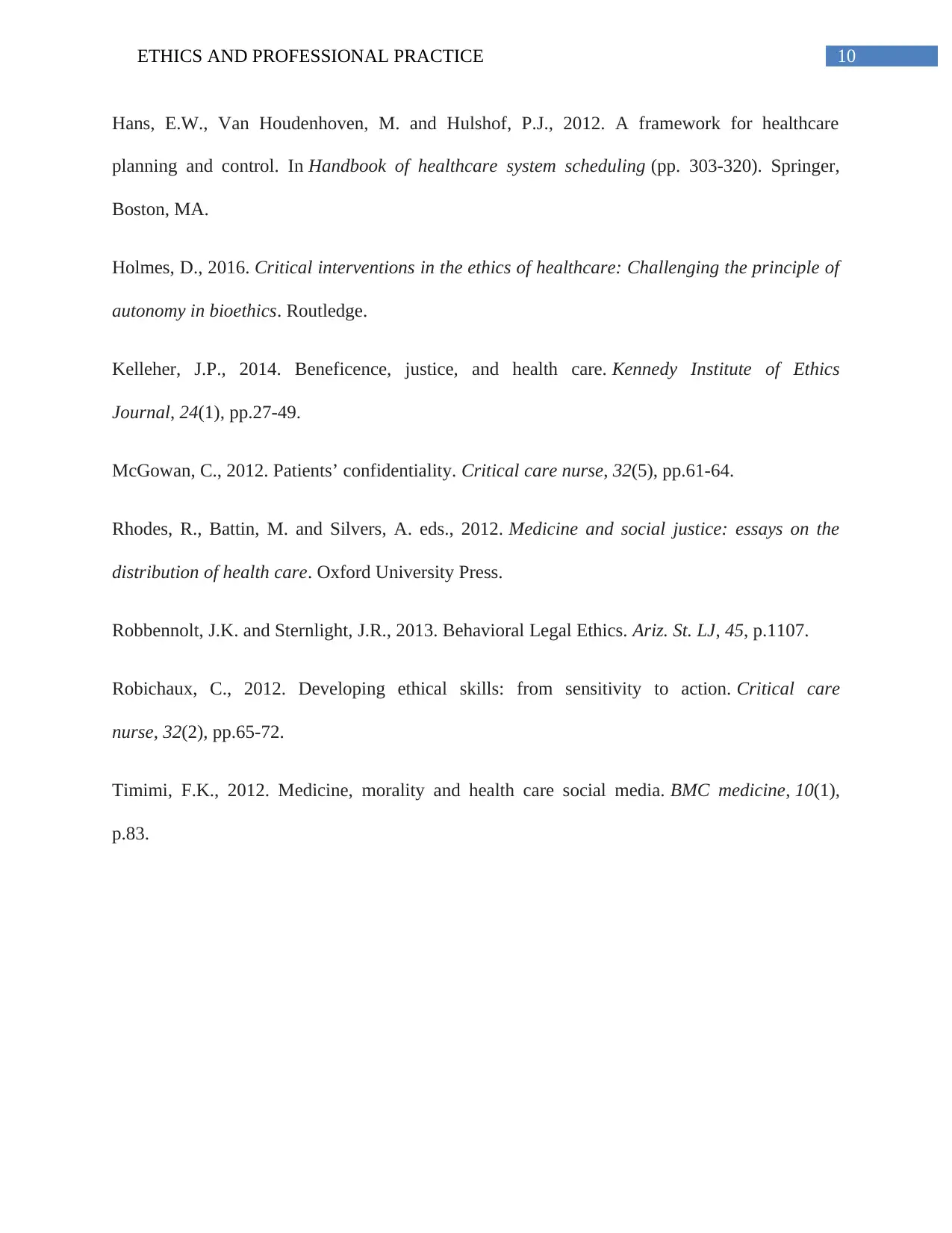
10ETHICS AND PROFESSIONAL PRACTICE
Hans, E.W., Van Houdenhoven, M. and Hulshof, P.J., 2012. A framework for healthcare
planning and control. In Handbook of healthcare system scheduling (pp. 303-320). Springer,
Boston, MA.
Holmes, D., 2016. Critical interventions in the ethics of healthcare: Challenging the principle of
autonomy in bioethics. Routledge.
Kelleher, J.P., 2014. Beneficence, justice, and health care. Kennedy Institute of Ethics
Journal, 24(1), pp.27-49.
McGowan, C., 2012. Patients’ confidentiality. Critical care nurse, 32(5), pp.61-64.
Rhodes, R., Battin, M. and Silvers, A. eds., 2012. Medicine and social justice: essays on the
distribution of health care. Oxford University Press.
Robbennolt, J.K. and Sternlight, J.R., 2013. Behavioral Legal Ethics. Ariz. St. LJ, 45, p.1107.
Robichaux, C., 2012. Developing ethical skills: from sensitivity to action. Critical care
nurse, 32(2), pp.65-72.
Timimi, F.K., 2012. Medicine, morality and health care social media. BMC medicine, 10(1),
p.83.
Hans, E.W., Van Houdenhoven, M. and Hulshof, P.J., 2012. A framework for healthcare
planning and control. In Handbook of healthcare system scheduling (pp. 303-320). Springer,
Boston, MA.
Holmes, D., 2016. Critical interventions in the ethics of healthcare: Challenging the principle of
autonomy in bioethics. Routledge.
Kelleher, J.P., 2014. Beneficence, justice, and health care. Kennedy Institute of Ethics
Journal, 24(1), pp.27-49.
McGowan, C., 2012. Patients’ confidentiality. Critical care nurse, 32(5), pp.61-64.
Rhodes, R., Battin, M. and Silvers, A. eds., 2012. Medicine and social justice: essays on the
distribution of health care. Oxford University Press.
Robbennolt, J.K. and Sternlight, J.R., 2013. Behavioral Legal Ethics. Ariz. St. LJ, 45, p.1107.
Robichaux, C., 2012. Developing ethical skills: from sensitivity to action. Critical care
nurse, 32(2), pp.65-72.
Timimi, F.K., 2012. Medicine, morality and health care social media. BMC medicine, 10(1),
p.83.
1 out of 11
Related Documents
Your All-in-One AI-Powered Toolkit for Academic Success.
+13062052269
info@desklib.com
Available 24*7 on WhatsApp / Email
![[object Object]](/_next/static/media/star-bottom.7253800d.svg)
Unlock your academic potential
Copyright © 2020–2026 A2Z Services. All Rights Reserved. Developed and managed by ZUCOL.





